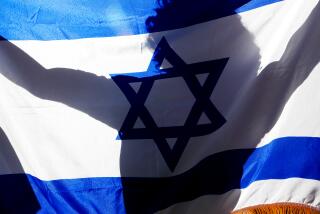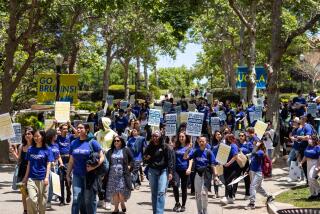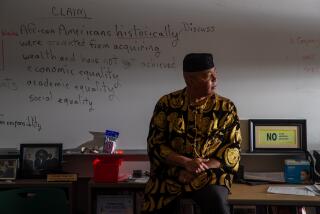Introduction to Survival : Chapman Freshmen to Wrestle With War and Peace
- Share via
Great minds have grappled with it. Over the years, great novels have been written about it.
Now, come next month, 400 fresh-faced 18-year-olds venturing onto an Orange County college campus will tackle the ponderous subject.
No, no one thinks that disharmony in the world will suddenly cease because every Chapman College freshman will meet in a course called “War and Peace” every Monday, Wednesday and Friday.
“Although, I’ll tell you, if we can inspire some people to act creatively in bringing about peace in the world, then that’s far more than I hoped for, but that would be the greatest good of all,” said Marilyn J. Harran, director of the freshman program.
Instead, the goals of the freshman seminar program are more pragmatic: to get students to think, to write, to debate, to examine different viewpoints, and then to use those skills in everyday activities, whether that is reading the newspaper, casting a ballot or making decisions in the business world.
Harran said it is possibly the first college course in Southern California to bring an entire freshman class together to study one subject, so the professors at Chapman wanted it to be a subject of social significance.
“I guess you’d call it a basic skills class, but we also wanted to do it, not out on a limb, but in the context of a genuinely important issue, and that certainly holds for the issue of war and peace,” Harran said.
“We’re trying to begin the process of building sophistication and analysis. How do you tell, when you’re reading the newspaper, how do know that when somebody says something, that it’s true? Or how do you differentiate between a fact and an opinion? What is the ethical basis that each individual has to come to in looking at an issue such as war and peace?”
Students will examine the causes of war, debate whether aggression is a human instinct and look at the aftermath of conflict. They’ll look at the changing face of war, at terrorism and how, since World War II, innocent civilians have become players on the battlefield. They’ll also look at the timelessness of the issue, at how struggles over territory and power have led to wars throughout the ages.
Will See ‘Patton’ and ‘Ghandi’
In addition to attending three classes a week, students will see films, including “Patton” and “Ghandi,” and hear speakers including former U.S. senator and presidential candidate Eugene McCarthy and Norman Podhoretz, a neoconservative and editor of Commentary magazine.
The diversity of viewpoints is essential to the course, which is not designed to be a series of anti-war rallies, Harran said.
“There are people who argue that under certain circumstances, war is necessary. One of the wars we’ll be studying is World War II, and you could certainly make an argument that the Allied response to the Nazis was necessary.”
Rather than portray the seminar program as a peace-studies class or an anti-war course, she said, “I would prefer to portray it as a course that will really allow the student to reach his or her own personal position on this.
The Thinking Process
“We’re not trying to cram any particular viewpoint down people’s throats. That’s not what the introduction into a liberal arts kind of course is all about.
“We’re trying to get people to think and to come up with good arguments for their positions, and to be able to say why they want peace and not war, rather than as simply a gut-level response to that.”
She said she wants students to be able to understand the different perceptions of war throughout the world. For example, she said, many students are shocked to find out that Iran’s head of state is a major religious figure.
“In this country, we have such a clear perception of the division between church and state . . . but for another culture, that’s all right,” she said. “Islam says there’s nothing that’s not religious, that society equals religion.”
In addition to learning about the anti-war movement in America, students should know that soldiers in the Middle East are willing to die because they believe “they’re going to be martyrs and go directly to heaven,” she said.
Across the country, there is a movement among colleges to develop freshman seminars, but even the best-known freshman courses have focused only on reading and writing skills, according to Tony Garcia, dean of admissions. Chapman’s course will do that, with weekly writing assignments and more than a dozen required readings, “but by means of a subject content,” Garcia said.
Chapman College, a private school with an enrollment of 2,100, chose to focus on the freshman class because professors wanted to give the campus newcomers “a common experience they would share regardless of their major,” Harran said.
“I think across the country it has increasingly been the case that students feel a certain amount of pressure, whether that’s from home or from themselves or from the educational institution, to go in on day one of their freshman career and declare a major.
“I feel strongly that needs to be de-emphasized, that, in fact, college should be, at least during the first two years, a period of experimentation, of getting to know a lot or at least a little about a number of different disciplines. And this course is directed at doing that.”
Twenty of Chapman College’s 100 professors, representing a cross-section of academic disciplines, will teach the course.
“You’d expect this to be taught by professors of political science and history,” said Dean of Admisssions Garcia, who will also be a teacher of the course. “But we’re having people with backgrounds in food science, communications, art, three administrators and others, all teaching this.”
A task force of Chapman professors drew up the course syllabus “really from scratch,” and the 20 faculty members met earlier this summer for four workshops to exchange ideas, Harran said. Now, in the final weeks before the fall semester begins, the professors are reading the books they will assign to their students.
“All of us are cramming the subject matter,” Garcia said. “It’s a fascinating experience.”
Harran, a professor of religion and history, said that despite the common syllabus, the professors’ varying backgrounds will result in a very different course, classroom to classroom.
“It’s a learning experience for the faculty,” she said, “The faculty in the program really are leaning on and gaining from each other.”
For example, she said, she is learning from Fred Caporaso, a food scientist, about how the need for food and territory bears on war and peace. From art professor Jane Sinclair, she is learning how art has reflected poverty.
“This doesn’t happen very often that a faculty agrees to teach outside of their field,” Harran said. “There’s pressure within a college, let alone a university, to do your specialty, to do the area you’ve been trained in and you feel comfortable in.”
Although Chapman’s course will not stop war in the world, it could make a difference as the students grow older and effect change in their communities, she said.
“Certainly one has to vote for candidates and take certain stands. Whether that’s on Central America or the Middle East or whatever, all this should come to bear,” Harran said.
If these students have learned to read, listen, think and question, she said, “we will have done a genuine public service, a service that goes far beyond the freshman year of college.”
More to Read
Sign up for our Book Club newsletter
Get the latest news, events and more from the Los Angeles Times Book Club, and help us get L.A. reading and talking.
You may occasionally receive promotional content from the Los Angeles Times.







